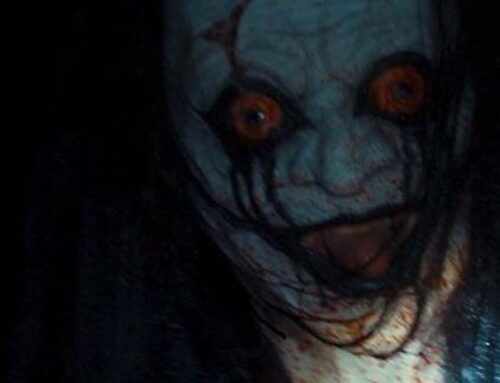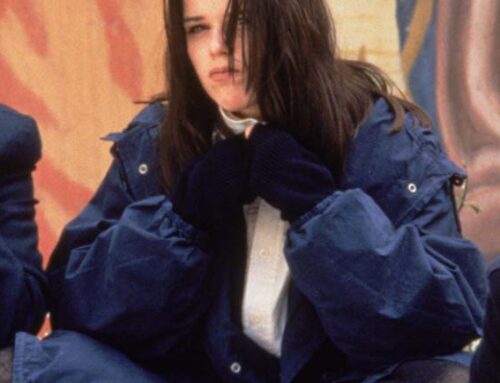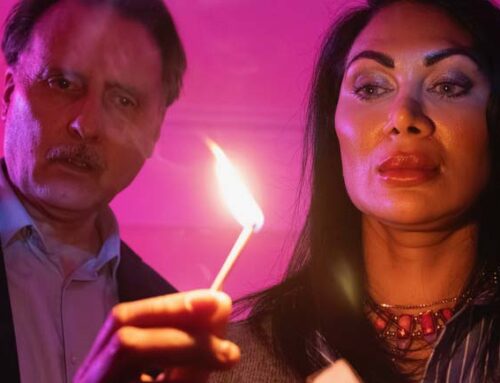Protanopia is about how a writer named Luke has strange dreams about an unfamiliar house after his sister goes missing. The homeowner, Alan Roscoe Jr., inherited it after his father’s untimely death. Now he participates in disturbing behaviour seemingly tending to the house in unsettling, bizarre ways.
Written and directed by Matthew Mahler, this labour of love received its financing from Kickstarter. It’s full of surreal imagery similar to Darren Aronofsky or Dario Argento. Luke’s dream sequences are distorted, hyperbolic depictions of Alan’s house. Is he seeing reality or hallucinating? It’s unclear. I especially love the use of blue, green, and red lights. The lighting adds to the surrealism tremendously. Most of the movie is about how Alan tries to run neighbourhood watch meetings after his dad passes away, whom was highly regarded and respected in the community. A woman named Janis gives him a hard time. In between these meetings, Alan experiences hallucinations of his father’s ghost. Or is it Paranormal? It’s unclear. The pacing is incredibly slow. I didn’t find it gripping, I couldn’t get fully invested because the 1 hour 13 minute run time feels longer. There tends to be more of a focus on giving us uncomfortable events to witness, rather than making sense of the horrors involved.
Timothy J. Cox is Alan Roscoe Jr. It seems like he read his part in the script just before acting it out on camera. Perhaps if he rehearsed more his reactions and expressions would feel more realistic. He feels so detached from everything around him that he seems like he doesn’t want to be there. It’s distracting.
Anthony Carey is Luke, the writer. He gives an engaging performance that’s poignantly empathetic. The search for his sister is the emotionally compelling heart of the film.
The rest of the cast doesn’t provide any outstanding performances. This includes Paula Mahler as Janice, John Heerlein as the Detective and James Chase as Mallory. They could’ve also had a few more rehearsals or perhaps more time with an acting coach to get the required takes.
Overall, I don’t understand a large chunk of Protanopia, admittedly. I watched it twice to be sure I didn’t miss anything. Is it too ambiguous or am I missing something? It begs the question should artistry be put before storytelling? It’s colourful but Is it saying anything? Not really. It appears to be lacking context, substance, and narrative structure. I’m not sure why the film is titled Protanopia. By definition, Protanopia means having blindness to red. It doesn’t refer to colorblindness whatsoever. It’s a very colourful film so perhaps it’s meant to be ironic. There are too many head-scratching moments for me to enjoy the experience. The conclusion is perplexing, raising an infinite amount of questions. Worst of all, it has such an abrupt ending I couldn’t help but ask myself “That’s it?” Nothing gets resolved. It just stops. This movie feels very pretentious. As if the director’s attitude was “Look how good of a filmmaker I am” instead of focusing on a concise story. It brings up themes of sin, quarantine, service, ritual, routine, greed and masculinity but it’s a surface level. I’d recommend it to Cinephiles not casual filmgoers. It’s not for everybody. And remember, if I did have Protanopia I wouldn’t be seeing red right now.
Grade 6/10
| Protanopia | ||
| RATING: | NR |
No Trailer Available
|
| Runtime: | 1 Hr. 15 Mins. | |
| Directed By: | ||
| Written By: | Matthew Mahler | |







